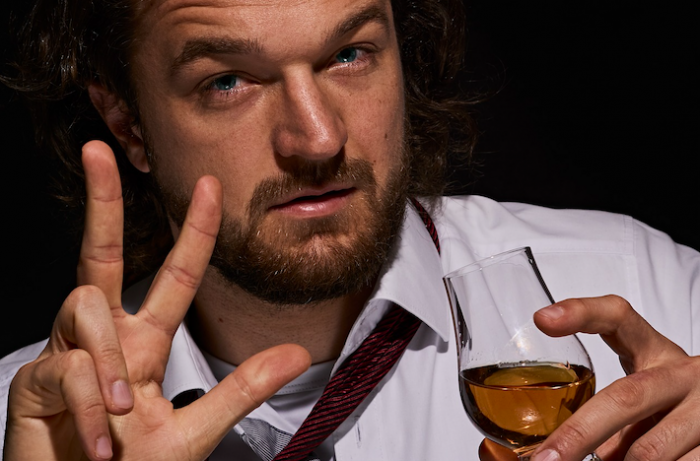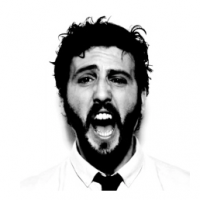*Warning! Adult language ahead.
~
A Drug Abuse Resistance Education
(D.A.R.E.) officer visited my high school and told us, “Young people think they’re invincible. This isn’t true!”
I sat in the back of the room with my hands under my bum. A voice in the back of my head said, “But I am, though.”
After graduating high school, I spent the next 10 years unable to sleep, socialize, or exist past 5 p.m. without excessive amounts of alcohol or drugs. We called the drugs “cheat codes.”
Want to sleep? Drink this or take that.
Want to have fun? Drink that or take this.
Want to socialize? Want to not be bored?
All of this drinking resulted in three years of on-and-off debilitating digestive issues, the pain of which I masked with (you guessed it) alcohol. It took months of blood and pain, ending in emergency surgery, before I finally thought, “Okay, maybe that D.A.R.E. guy was on to something.”
The aforementioned surgery (along with a heavy dose of guilt from my girlfriend) kept me sober after my surgery, but only for three months. Then I found myself in another doctor’s office, on a table with my head between my knees and a 10-inch tube up my rectum. The doctor said, “If you don’t stop, you will be back on this table very soon and it will be much more painful.”
It took another six months before I started to feel normal enough to notice the many changes being sober made to my life. I was bored all of the time, I couldn’t sleep, and I was anxious in social situations. I realized that if I didn’t find ways to solve those problems, I’d be back to drinking again. I would talk to people about these problems, but nothing they said felt helpful.
Just like had happened with the D.A.R.E. officer, the voice in the back of my head felt louder. It was always saying, “This sucks, have a drink.”
The truth is, I loved drinking. None of the warnings people gave me ever impacted my life. I kept steady work and healthy relationships. I never became angry, violent, or sad when I drank. But that meant I had to find my own way to stop, for my own reasons, with new things to love.
When I was drinking, time felt relative. Sober, time was not. When I was hanging around the house at night, I would look down at my phone and think, “Holy shit, it’s only 8:30?” I’d distract myself, eat something, take a shower, draw a self-portrait, write a sonnet, learn Chinese, clip my toenails, and then look down at my watch again and think, “Holy shit, it’s only 8:35?”
Everyone said things like, “You’ll appreciate moments more when you’re sober.” And this is true to some extent. I did notice moments of listening to the long, dragging sound of your slippers on the wood floor, or adjusting the rug beneath the coffee table because it was slightly crooked, or making that plant over there off-center and, now that you mention it, I should move that plant to the window so it gets some sunlight. Then: “Holy shit, it’s only 8:37?”
My girlfriend tried to keep up with me by reorganizing her makeup shelf, making faces at the cat, reading a book, and taking Instagram pictures. Then she would throw up her hands and cry, “Would you sit down?”
So, fearing for my life, I sat down, opened a book, and began to read. From there, I started reading for four or five hours every night. I’d forgotten that I could read at night because reading is not a drunk man’s pastime. It was nice to rediscover something I’d loved and lost. I still wanted to drink, but reading was the first of my “new loves” and it was a step in the right direction.
When you’re sober, you’re that kid at the party who’s allergic to candy. Remember that kid? Me neither. No one remembers that kid. He was at home being spoon-fed pureed carrots. But when you don’t drink, you’re that kid and every weekend is Halloween. All of the other kids in the neighborhood still want to invite you out but they never know quite what to do with you.
They might say, “Hey Jimmy, I know you can’t eat candy but we’re all going out this weekend to Trick or Treat and get doped up on Tootsie Rolls. I know you can’t have any of the candy but you could sit, watch us, and eat grass?”
This makes socializing a painful process, especially when you go out with people who are used to drinking with you. There is no easy way to navigate this, but I’ve found two helpful steps:
1. Order a soft drink. I personally go for seltzer with grenadine and lime. Not only is this quite tasty but it also looks like an alcoholic beverage so fewer people will comment. Plus, many bars hand these drinks out for free so you’ll save a bucket of money.
2. Talk about your butt. This one might not work for you, but my issues with alcohol directly impacted my ability to go to the bathroom, and subsequently resulted in that part of my anatomy being sliced open. You’d be amazed by how quickly people accept your sobriety when you start talking to them about butt surgery.
People have faces that make noise and now you have to pay attention to that noise. This might come as a surprise to some, but people aren’t that interesting. (Except you. You’re fascinating.) Imagine watching YouTube videos at five times the speed for 10 years. Then one day, YouTube takes that option away and you’re now condemned to watch all of your favorite videos at a normal pace for the rest of eternity. That is the way conversations happen when you’re sober.
In the time it takes for me to respond to someone’s question of, “How are you?” I’ve already thought, “How am I? What a great question. I am curious why you haven’t gotten that mole on your nose removed, because you know it’s really easy these days. Maybe he likes the mole where it is? Maybe he finds it distinguished and takes pride in its placement because he has to come to terms with it after years of teasing as a child. Oh god, would I have teased him as a child? I hope not, because I was a good kid…I think. It’s hard to remember. I wonder if my memory of my childhood is fuzzy because something traumatic happened. But who traumatized me? Certainly not my gym teacher, he was cool. Oh, shit, wait, I’ve got to answer this question mole-face—I mean James—just asked me.”
I turn to you and say, “I’m fine. You?”
When you’re drunk and someone asks how you are, there are no thoughts. The conversation is instinctual. So finding yourself in a sober conversation after being drunk for 10 years is like finding out that you’ve forgotten how to swim after jumping into the ocean. You overthink, flail, close your eyes, and drown.
I don’t know if my solution to this one is best, but I quickly realized after I quit drinking that there were many people in my life whom I didn’t want to talk to. They added no value to my life or worse, they devalued my time. They’re gone now.
Once you stop drinking, your invitation to the pity party has been revoked. If you’re like me, you get to the end of a long and taxing day. You eat dinner, watch something on television, then walk into the bathroom, look in the mirror, and say, “Oh, you piece of shit. It’s still you.”
Before, I played the blame game: “You’re an alcoholic. It’s alcohol’s fault that you feel like shit every day. It’s alcohol’s fault that you can’t focus on words long enough to read a book. It’s alcohol’s fault that you can’t go to the gym because you can’t find the motivation to get there. Thank God for alcohol, otherwise, that asshole looking back at you in the mirror would be you.”
But when I stopped drinking, nothing changed. I didn’t feel like crap anymore but I still hadn’t gone to the gym. I still didn’t like the person looking back at me. Who could I invite to my pity party if not alcohol? I felt as though everyone had tricked me into thinking sobriety was the cure to my woes. The lack of alcohol meant I had to actually learn to love myself without pity, which involved taking care of myself.
I am not one of those people who is psychotically driven. When I read a self-help article, I don’t think, “Oh, I need to do that.” I think, “Fuck you for having your shit together.” Thus, every step toward caring for myself was made of wet concrete. The route never ended. But perhaps the most valuable thing I realized was that I don’t expect this work to end. Alcohol is a quick solution to any problem, but actual solutions take time, patience, and continuous effort.
Some people don’t see the appeal in alcohol. High fives for them. But for self-critical people with social anxiety, alcohol is a marvelous invention. When you quit drinking, your friends and family members might assume that love and support are all a person needs to wake up to the beauty of sobriety. But this isn’t true. People need more than support; they need solutions, alternatives, and creative thinking. Otherwise, best-case scenario, we just get addicted to something else: sex, food, Jesus, yoga, reading, or selling hand-crafted jewelry on Etsy. You get the picture.
As I write this, it’s been one year since my surgery. I have one week until my 30th birthday. Nearly a year ago, I sat on a six-hour flight I couldn’t miss with written warnings from the doctor and six baby-wipes tucked under that bum I’d so comfortably held all those years ago. I’ve logged nine months of sobriety, dozens of books read, thousands of pointlessly adjusted pieces of furniture, and countless aches and pains.
With the money I’ve saved by avoiding the bottle, I’ve bought an iWatch that yells at me if I don’t exercise. I have standing monthly appointments with a nutritionist who no longer rolls her eyes at the sight of me. I’m moving forward, I think.
Now, if only I could quit smoking.
~











Read 4 comments and reply